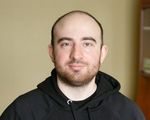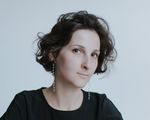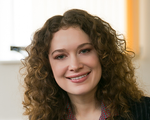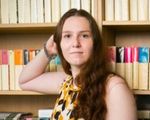About Success Builder
How do you find your place in life? How do you find something to do that both comes naturally to you and makes you happy? The answer is that you have to apply the knowledge you’ve gained from university and from life itself correctly. The Success Builder Project features HSE University graduates who have discovered themselves through an interesting business or an unexpected profession. The protagonists share their experiences and lessons learnt and talk about how they’ve made the most of the opportunities they were given.
Despite the fact that written texts are losing to visual imagery in today’s media, people who have a way with words are still in high demand. In the latest edition of Success Builder, Pavel Sokolov, a graduate of the HSE Faculty of Communications, Media, and Design and the editor-in-chief of the Eksmo publishing house website, discusses what is currently happening in the world of books, what comprises the duty of a Russian intellectual, and how to be both a manager and a playwright.
How did your relationship with text begin?
I was always surrounded by books since my parents bought them willingly and were collectors. Plus I loved to read. But I don’t want to go into my biography. I’ll talk about one distinct episode from my childhood. I got really sick in the fifth grade and lay at home for a long time. I found an old high school history textbook, and I read the entire thing in one evening. This left a huge impression on me.
Why did you decide on entering the journalism faculty?
It just happened I think. Before enrolling at HSE I participated in the TV show Umnitsy I Umniki (The Smarts) and was given preference when applying to MGIMO, but I still decided on HSE. I got in through the multidisciplinary Olympiad. It was 2006, and I saw it as a promising and alluring university with a lot of distinguished professors, including Kucherskaya, Polivanov, Arkhangelsky, and Nemzer – overall, a portrait of Russian language arts. During my undergrad, we formed a literature circle thanks to Elena Penskaja. I wonder if it still exists.
21 mln
books is how much Eksmo boosted its print circulation by in 2017
Source: Eksmo
There is Book Club with Galina Yuzefovich. So were your expectations met at HSE?
HSE was good because, besides a strong theoretical foundation, it provided students with practice – introductory practical training during freshman year and work placement in the following three years. I ended up interning with the government, so to speak: Channel One, the All-Russia State Television and Radio Broadcasting Company, and the newspaper Izvestia. Thanks to my internship experience, I knew that working for the state-owned media was definitely not for me. At the time, HSE would hold lectures by Olga Romanova, who participated in the launch of the website Slon.ru in 2009. They needed junior-level journalists, and thanks to Olga I got a little bit of experience working for the site as an international news columnist. I would also freelance and write material for various publications to gain experience.
In 2011, when I was in my master’s programme, I got an internship for the website of the Russian edition of Forbes. I initially stayed on as a freelancer writer, but then I became an editor for the Lifestyle section of the website. I then moved on to Harvard Business Review - Russia, where I worked as a website editor until 2016. The work was interested and completely in line with my major, as I focused on the site’s management and relaunch. Before that though, the Harvard Business Review – Russia website was just a hyper-specialised news source that was well known in more narrow circles. When I was leaving the publication, brand recognition had grown tenfold, there were three times more followers on social networks, and our articles and interviews were being shared online. Overall, I was able to bring something besides a diploma to my new job. At the same time, I felt that I’d plateaued and was stuck creatively.
What did you have to do as the site’s editor, and how did these responsibilities correlate with your education?
Firstly, I had to manage a huge workload – at least 15 pieces of material a week. Secondly, I worked with translators of foreign articles and blogs, communicated with Russian bloggers, and supported the site’s concept by promoting it on social networks and other platforms.
My knowledge of economics and sociology really came in handy, especially when it came to routine editorial work. And as for the site’s rollout, the knowledge I had gained during my lectures on mass media theory made the process seamless. Things were sometimes just like the textbook.
Where and how might a graduate of the journalism faculty work now?
You could set up your own media platform, maybe become a blogger like Yury Dud. He’s the editor-in-chief of Sports.ru and also makes money on his YouTube project vDud.
Good marketing doesn’t jump right out at you. We try to strike a balance between quality content and our business interests
Nowadays there are unfortunately only a handful of cases where personal fulfilment is accompanied by good money in the field of journalism. A large number of my classmates do not work in media actually, and instead are somewhere between PR and the digital realm. Someone might be an entrepreneur, someone might immigrate. But judging by their Facebook posts, they are doing all right.
Can you talk about how you ended up at Eksmo?
When I worked at Harvard Business Review – Russia, I also started giving lectures on literature and looking for a creative outlet alongside my profession. The opportunity to work at the country’s largest publishing house as an editor-in-chief seemed like an incredibly interesting offer to me. I send Eksmo my resume, and when they invited me to an interview I was certain I’d be given a lot of creative freedom there. I was drawn to the opportunity to grow and create something interesting. The site was successfully relaunched recently, and this proved that. This was also demonstrated by the fact that our recent relaunch of the site was successful and that we won first place in this year’s Rating Runet for the ‘Media, Publications’ category.
The site was split into a corporate side and Eksmo Journal, which is devoted to different topics. We publish interviews with writers, translators, and editors, and we also write about film and culture in general. And the site improved visually as well.
As a result, is your work more creative than managerial? You’ve done some wonderful interviews, for example.
A large part of it is management, while I have left the creative side of things to my colleagues mostly, though I do work on some things myself sometimes – for example, the interview with one of Russia’s best known Japanese scholars Alexander Meshcheryakov. With this interview, I was in my element, and we had something to talk about.
Overall there are three aspects to my work. I’m the site’s main editor, a populizer of literature, and the author of creative works. They all come together somehow.
Is the marketing department super demanding of you? I always worry how these two things coexist in an interesting field of work.
Good marketing doesn’t jump right out at you. We try to strike a balance between quality content and our business interests in order to put out a book properly. After all, reviews by the aforementioned Galina Yuzefovich, for example, are also a type of marketing.
As both an author and an editor, what can you say about censorship?
There’s a paradox – amidst a complete lack of freedom in the modern Russian media (look at what is happening now with the Russian version of Forbes, where I worked five years ago), broad freedom exists in the literary world. This concerns prose, not to mention poetry, which has flourished in the last decade. I won’t even mention playwriting; go see Teatr.doc’s plays, in which total liberation reigns. First and foremost, I’m talking about texts. With theatre you can see for yourself what’s happening. And what turns did the Seventh Studio ordeal take.
At the same time, the internet offers full access to the works of authors and playwrights. A beginning writer can post their poetry or prose online and rely on their own abilities to determine if a community forms around them or not. Here, social networks have become fairly serious instruments for building up a readership. Take a look at the number of followers Boris Akunin, Tatyana Tolstaya, and other opinion leaders have on Facebook. These people themselves have already turned into fully-fledged news sources.
Is the written word currently going through a crisis? Has Eksmo cut the number of books it publishes?
The number of e-books and audiobooks being published is rising, but in spite of everything print is also growing. Books are changing and morphing to meet the demands of certain readers. When driving to work, for example, I listen to an audiobook or a lecture, while I read traditional books or e-books on public transport. Again, it’s always good to flip through a beautiful book with a pretty cover printed on nice paper. I myself collect secondhand books – volumes published by Academia (the one destroyed in 1937), as well as books that came out as part of the Literary Monuments series in the Soviet Union.
I only show my work to a few people whose opinions are important to me. Then I send it to competitions, and if nothing happens, then oh well
Lectures have become a rather important part of your life. For example, at the Nekrasov Library you talked about Japanese literature. How did this all begin?
It started in around 2012 with lectures at Ziferblat, which had a wonderful space and rather intelligent audience. Then there was Punktum, Lecture Kurilka Gutenburg, and finally, Nekrasov Library.
Why Japanese literature in particular – because 2018 is the Year of Japan in Russia?
Not just because of that. I don’t encroach on the territory of professional Japanese scholars; I just speak as a populizer of literature from our neighbours to the East. As for my interest in Japan, I fell in love with it back during my undergrad. I also like 20th century Chinese literature. There have always been incomparably more Japanese authors than Chinese if we are talking about contemporary writers, and this has proven true in practice as well. More people gravitate towards Japanese literature, even though the experience of the Celestial Empire from the second half of the previous century is closer to us in the historical sense.
I have also lectured on 20th century Russian, American, and British literature. One of the most fascinating subjects is also contemporary playwriting. In order to write good plays, you need to read good plays as well, which is easy to do because modern play anthologies are being published with amazing regularity. Contemporary authors also frequently publish both online and in print; take Vyrypaev, for example. But educational lectures on this topic don’t happen very frequently.
When did you first try your hand at playwriting?
I can’t call myself an active playwright; I don’t make money off my plays or even aim to. I’m an armchair writer. I only show my work to a few people whose opinions are important to me. Then I send it to competitions, and if nothing happens, then oh well. I move forward.
As for the Author’s Stage competition, participating in a festival is very nerve-wracking. Plus my play is based on real events, and the issues raised in it are fairly problematic. From my experience showing it in Chelyabinsk, I know that contemporary plays really bother people. It lasted for an hour, after which there were two hours of discussion, which sometimes was more of an argument. But a big thank you to Alexey Slapovsky, who was a terrific moderator of the discussion. He was supportive if a lot of ways.
What is your ‘output rate’ as an author?
I write one play a year, sometimes two, but that’s rare. I’ll also write a few essays or short stories here and there. I write by hand and then type everything up, so I work slowly, and I keep a journal, which goes without saying.
As of right now, do you think you’ve realised your full potential professionally and creatively?
A common antiology exists that says when money is the goal, creativity automatically dies. I try to strike a balance. In this sense, I really like the Eastern idea that a person in ancient China could be an official and nothing would stop him from writing poems or studying philosophy. Moreover, this was useful both for the official and his country. I know I can do good while wearing different hats. Marietta Chudakova, with whom I worked at Harvard Business Review – Russia, once said that it is the duty of the Russian intellectual to enlighten people. I completely agree with that statement. Above all, I associate myself with my country and with the Russian language.
Your focus for the distant future?
I don’t venture off that far. It’s important to do your work well, and that’s it.














































































































































